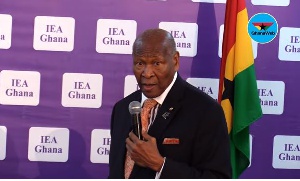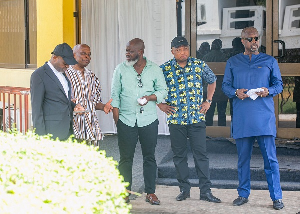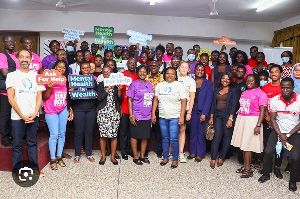A member of the Council of State, Sam Okudzeto, has rebuked small-scale miners and Civil Society Organizations (CSOs) calling for the immediate wind up of government’s indefinite ban on all small-scale mining activities in order to deal with illegal mining practices commonly known as galamsey.
Mr. Okudzeo said, listening ears must not be given to the small-scale miners as the development requires critical and technical scrutiny irrespective of their cries.
He argued that the locals and foreigners are objectively trumpeting needless arguments for selfish gains at the expense of the environmental threat of their activities.
“The truth is that they are not being realistic… There is so much concern about money to such an extent that when you expect those in the environment to report the illegal mining, the Chinese who have come into the forest and they are mining, they will not report because the Chinese will give them money and that’s the end. This is what has happened to Ghana now,” he said.
The Council of State member made the comments while speaking at a public lecture organised by the Institute of Economic Affairs (IEA) in Accra on Thursday on the theme: "Towards reforming and restructuring Ghana’s Small-Scale Mining Sector: Lessons and Best Practices to shape policy formulation.”
The government, in March 2017 placed a ban on illegal mining and small scale mining activities following a strong wave of media campaign on the menace that has left many water bodies polluted and farmlands destroyed.
The decision has over the period attracted a backlash from small-scale miners who insist that they had licences and operated within the legal environmental requirements and that their rights had been trampled upon.
They have also argued they have been rendered jobless.
But Mr Okudzeto believes the government’s decision to continue with the ban was appropriate, given the poisonous footprints illegal mining had left in the country’s water bodies and soils.
The Lawyer contended that the numerous arguments by such stakeholders should not be a justification for the ban to be lifted abruptly.
He maintained that their suggestions and recommendation in bringing an end to the fight is ‘unrealistic’ because it does not echo a sustainable reform.
“The issues raising is important but at the moment it is just not workable. We would need to do much more work... I’m afraid this issue requires much more work than people are making noise about and I can’t see anybody trying to convince me, that the ban should be lifted,” he maintained.
He also noted that best practices such as farming should be encouraged rather than galamsey which poses threat to human life.
Government’s action
President Nana Addo Dankwa Akufo-Addo, however, recently assured that within a short period, his government will put out a statement setting out a comprehensive roadmap, including the lifting of the ban on small-scale mining, to deal with, on a permanent basis, the grave threat of galamsey to the present and future health of Ghana.
The government’s grand plan towards ending illegal mining includes the establishment of district mining committees in mining areas across the country, the deployment of Operation Vanguard, fitting tracking devices in excavators used in mining districts, and the use of drone technology, among others.
After the deployment of Operation Vanguard nearly a year ago, the Ministry of Lands and Natural Resources has procured the drones and will soon deploy them.
Over 200 drones have been procured to assist its fight against illegal mining across the country. The machines will be used to take live images in districts where the practice is rampant.
Business News of Friday, 13 July 2018
Source: www.ghanaweb.com

















